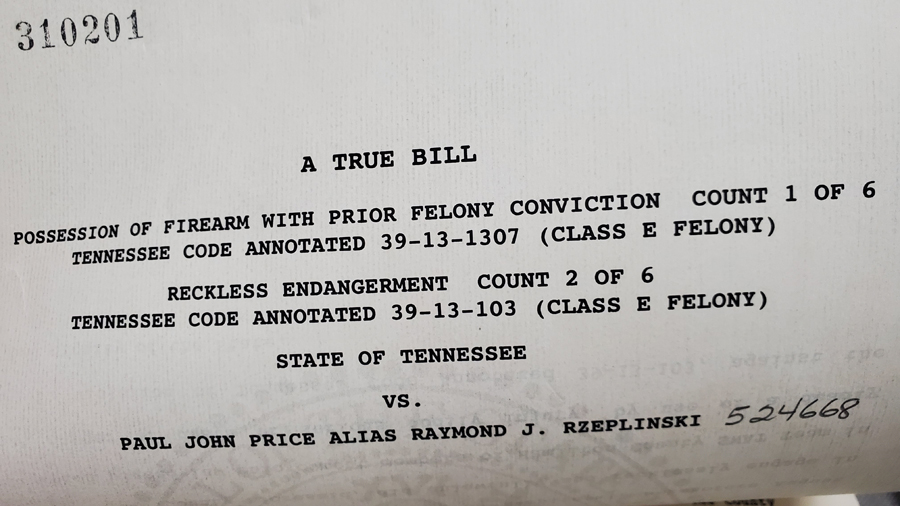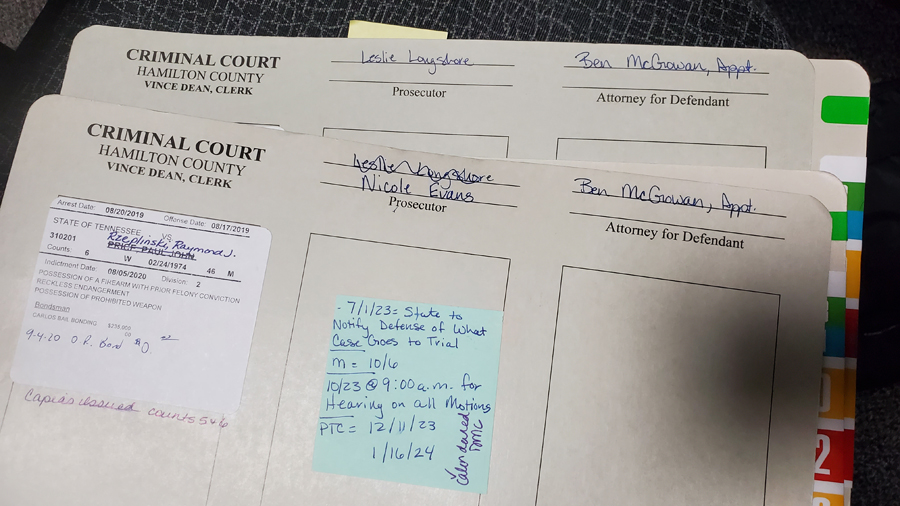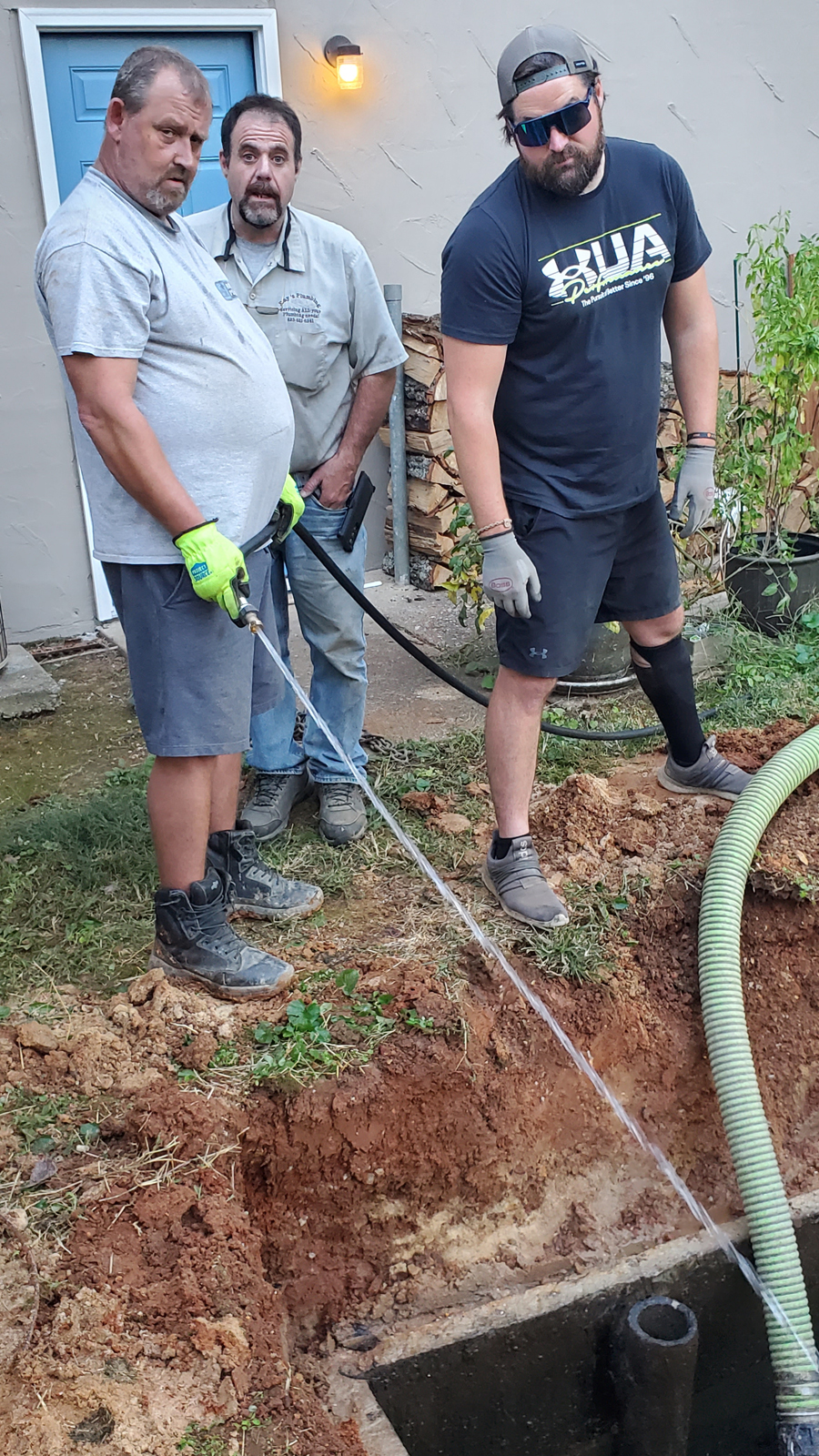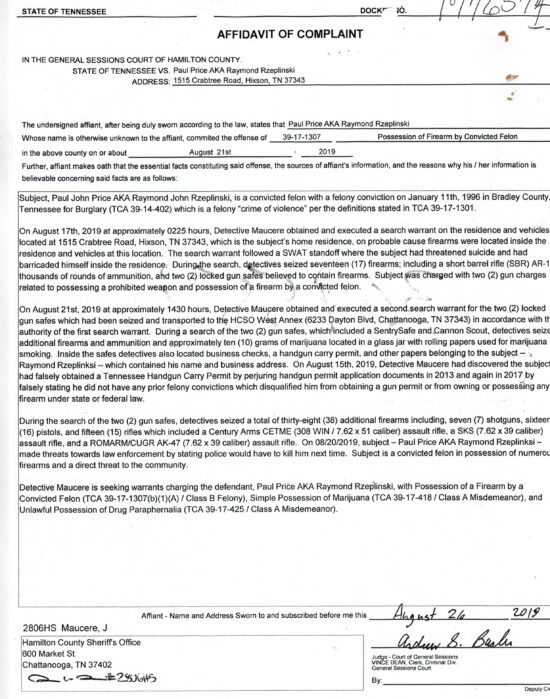
Ray Rzeplinski is in his shop in Chattanooga, getting ready for a day’s work. He is an investor in guns from the proceeds of Ray’s Plumbing, a business badly damaged by his prosecution in a case alleging he is a felon in possession of firearms. (Photo David Tulis)

The Hamilton County sheriff’s department, formerly under Jim Hammond and now under former Chattanooga policeman Austin Garrett, obtains a true bill in secret proceedings with no way to determine if perjury is behind the testimony. The indictment under a never-used alias is prejudicial, Mr. Rzeplinski says in a court motion. (Photo David Tulis)

The case described in the Rzeplinski file in Hamilton County criminal court clerk’s office appears to arise from hidden personal animus that gets the gears of a state prosecutor into motion in a bizarre beating and arrest case against a Chattanooga plumber. (Photo David Tulis)

Plumber’s helper David Dulgar, left, hoses down an open septic tank at a house in Chattanooga as Ray Rzeplinski, center, talks about the next day’s removal of the cracked tank. Matt Fox of Harmon septic service is a(Photo David Tulis)

This is the affidavit of complaint against Ray Rzeplinski, a plumber on the receiving end of abuse of process in Southeast Tennessee.
CHATTANOOGA, Tenn., Wednesday, October 25, 2023 – A plumber who got on the bad side of parties in the Hamilton County sheriff’s department is facing a criminal trial in January in a case that hinges on whether he knew he was a felon from the time he was a 20-year-old involved with pals who burgled cigarettes from a Bradley County business.
By David Tulis / NoogaRadio Network
Ray Rzeplinski is a prosperous plumber in Chattanooga who was beaten nearly to death by the Hamilton County department SWAT team in a case alleging he is violent, owns an illegally short rifle under a now-changed law and is a felon who “did unlawfully and knowingly” possess firearms after he had been convicted in Jan. 11, 1996, in Bradley County, case No. 95-402 “against the peace and dignity of the state.” To justify the beating, he is being charged with “resisting arrest,” a criminal accusation that requires the use of violence to thwart an officer’s arrest.
The case involving him was initiated by others, who took property under F$500, yet it appears to be described now as a felony of violence and the case is prosecuted against John Paul Price, with his real name — appearing on concealed carry permits, contracts and state licenses — given as an alias. Mr. Rzeplinski, who had an attorney’s aid, remembers a plea bargain – but not a plea bargain upwards or sideways, from felony to felony, but a plea bargain over a misdemeanor down to a theft.
Coty Wamp, district Attorney General in Hamilton County is prosecuting Mr. Rzeplinski under an indictment obtained by former Attorney General Neil Pinkston on the basis of a report by a county detective Jason Maucere on April 26th, 2018. The arrest came as Mr. Rzeplinski was to meet with the officer to discuss growing evidence of theft at his business, at a shop in Middle Valley.
Officer Maucere says he obtained a search warrant on Aug. 17, 2019, against Mr. Rzeplinski’s house at 1515 Crabtree Road in Chattanooga. “The search warrant followed a SWAT standoff with a subject had threatened suicide and had barricaded himself inside the residence”, the statement says. Mr. Rzeplinski says the narrative is bogus, that he was not suicidal and was sitting in his garage with the door open, as he often does. The description of a standoff is a smear, he says, disputing the arrest date.
“Detectives seized 17 firearms including a short-barreled AR-15 as well as thousands of rounds of ammunition and 2 locked gun safes believed to contain firearms,” according to his affidavit of complaint. “Subject was charged with 2 gun charges related to possessing a prohibited weapon and possession of a firearm by a convicted felon.”

Tearing off the lid of a septic puts a stink into the air as a Ray’s Plumbing mass excavator awaits its next assignment. (Photo David Tulis)
Mr. Rzeplinski says he has an incomplete accounting of the property, including “more than a million” cartridges, more than 70 firearms worth more than F$100,000.
Mr. Maucere says that Mr. Rzeplinski “falsely obtained a Tennessee handgun carry permit by perjuring handgun permit application documents in 2013 and again in 2017 by falsely stating he did not have any prior felony convictions which disqualified him from obtaining a gun permit or from owning or possessing any firearm under state or federal law.”
An issue before criminal court judge Amanda Dunn is whether the prosecution can proceed in an offense that is to have occurred before the law regarding “short” rifles was deleted, and prosecuted after the law is deleted. The general assembly altered the law effective July 1, 2022, via bill No. 2628.

An SKS rifle figures into the case State of Tennessee v. Ray Rzeplinski.
The law is 39-17-1302, prohibited weapons, with section (a)(4) – “short-barrel rifle or shotgun.” stricken. Untouched are other forbidden weapons: Machine gun, hoax devices, knuckles, “explosive or explosive weapon.” The law lists defenses, and affirmative defenses such as the weapon is in a “nonfunctioning condition” or possession is a consequence “”of having [been] found” or “taken from an aggressor.”
Wamp assistant DA Nicole Evans says the law is not retroactive, and that there is no lesser charge option by which penalty for a no-longer-in-effect law may be eased under the so-called criminal savings statute, with penalty reduced under the subsequent newer law.

Prosecutrix Nicole Evans
Attorney Ben McGowan, serving for F$50 an hour as a public defender, cites the repeal of the law and demands dismissal “of a clearly unsustainable charge” and alleges Mr. Rzeplinski’s due process rights are violated in the case. In a Feb. 23 filing, he cites “prosecutorial inaction or misconduct that offends due process.”
Assistant DA Leslie Longshore proposed a trial for November 2022, because “Mr. Rzeplinski will not accept my offer,” according to a letter to Judge Tom Greenholtz, who initially oversaw the case and who signs emails with “my best.” Judge Greenholtz, scrupulous about rights of defendants, assures Mr. Rzeplinski the he will be treated fairly.
Judge Greenholtz assigns Mr. McGowan, from the highly regarded Jerry Summers law firm, to represent the plumber., assigned Oct. 26, 2020 at the regular F$50 an hour indigent defendant rate. Mr. Rzeplinsk is in bankruptcy on account of the prosecution and no longer employs a bevy of helpers and office staff.
Mr. Rzeplinski withstood pressure from DA Wamp’s office and a federal prosecutor to plead guilty. In refusing to plead, he rejects a threatened federal prosecution “leverage letter,” to use Mr. McGowan’s terminology, and the case file indicates the U.S. government – while willing to dole out threats — is not interested in a criminal case with so fragile a premise. Prosecution redounds to Hamilton County again, with Mr. Rzeplinski having been warned a superseding indictment is coming.
The case includes allegations that he “did unlawfully and recklessly engage in conduct which placed law enforcement members of Hamilton County SWAT Team imminent danger of death or serious bodily injury, by use of a weapon weapon, in violation of (TCA) 39-13-103.” The allegations are bogus, he says.
Mr. Rzeplinsky says that his ex-wife, married to a deputy, has poisoned his name and created a hatred against him so deep that he says he is under surveillance by officers in cruisers and operating drones. His helper David Dulgar confirms that the Ray’s Plumbing truck is often followed, as does Mr. Rzeplinski’s girlfriend, Jackie Cordell.

Coty Wamp is district attorney in Hamilton County
A prosecution for being a felon in possession of a weapon is a one charge case, no matter whether the accused has one gun, or a 100. There’s not one charge per weapon. The prosecutor deputy addresses the Hamilton County grand jury in sworn statements for which no account is made and that are unable to be prosecuted if perjury occurs.
The indictment lists six charges.
- Owning an AR-15 (described as a “handgun”) while a felon
- Assaulting officers 39-13-103
- Owning SBR AR-15 short barrel rifle under 39-13-1302 while a felon
- Obstruction and resisting, T.C.A 39-16-602
- Possessing a shotgun in his F-250 truck (called “a handgun”) while a felon
- Possessing a handgun in the same truck while a felon
This is a quadruple stack on the allegation of being a felon in possession of a weapon, and it’s not clear why Miss Wamp stopped at four and did not list a charge for each firearm seized. A single charge is proper for felon in possession of a firearm.
His appearance in court is guaranteed by a F$75,000 bond. His initial arrest — one of three in the prosecution — is under a F$235,000 bond, and he faces another bond demand and arrest if the DA wins a superseding indictment.
A second version of the August 5, 2020, indictment adds particulars as to the weapons, including an SKS in his gun safe and also a “CenturyArms CETME 308 WIN/7.62×51 caliber assault rifle.”
‘Knowingly’ possess weapon
Mr. Rzeplinski says he cannot be charged with the crime of being a felon because he isn’t one. His prosecution as a teenager was not for a felony, but a misdemeanor. Mr. McGowan, he says, insists there is no dispute about the Bradley County criminal court records, and that he must get real because he is a convicted felon.
But Mr. Rzeplinski says the record is clear that he is not a felon, and that he can prove he knows and has always known that. He says if he were a felon, he would not be able to have a plumber’s license. He would not have been able to get government business, such as major work at the Bradley County courthouse. He would not have passed at least two background checks by the TBI for applying for a handgun carry permit. He would have been red-lighted buying firearms retail. These background checks and multiple approvals confirming he is not a felon are sufficient to win him protection of the estoppel doctrine. Meaning, his reliance on government information about him defeats the prosecution, estops an entrapment.
He insists that he relies on this record by government, which effectively undoes any record of felony, if subsequent record affirms at worst he is a misdemeanant. Mr. McGowan is not pursuing the “reliance defense” as an affirmative defense against the felony counts, Mr. Rzeplinski says. It’s not clear from the court record that a better defense exists.
Mrs. Evans does not immediately reply to an email requesting comment.

